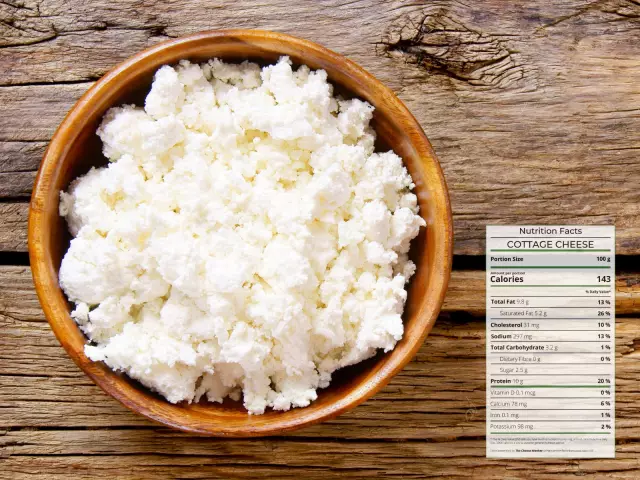- Author Rachel Wainwright wainwright@abchealthonline.com.
- Public 2023-12-15 07:39.
- Last modified 2025-11-02 20:14.
Cheese sauce
Cheese sauce is an additional dish to meat, vegetables and fish, which is made from melted cheese, broth, herbs and spices.
Composition and cooking features

Cheese sauce is made using cheese, flour, butter and milk. When preparing this sauce, you can add different types of cheese to give the dish a spicy and original taste.
Cheese as the main ingredient is grated and mixed with melted butter and milk, which is pre-boiled in a saucepan. Moldy cheeses can give a special taste to the dish.
When mixing the main components, a prerequisite for proper preparation is the gradual addition of cold milk and bringing the sauce to a boil.
Garlic, mushrooms, spices, mustard, mayonnaise and spices can be used as additional ingredients for the cheese sauce. The thickener is flour, which is fried until light brown before adding to the sauce.
Cheese sauce can be prepared in a bain-marie with cream, egg yolks and starch. After the cheese is completely melted, add lemon juice, and then add herbs and spices.
Ready-made cheese sauce will be a good dressing for meat, fish and flour dishes, as well as desserts and snacks. This sauce goes well with croutons, casseroles, sandwiches and sandwiches.
Calorie content of cheese sauce
Cheese sauce is a high-calorie food that is not suitable for inclusion in the diet. The calorie content of cheese sauce is 356 kcal.
It contains 36 g of milk fat, 2 g of protein and 5 g of carbohydrates.
Useful properties of cheese sauce
Cheese sauce has a number of beneficial properties due to the content of minerals and vitamins in it. It promotes quick satiety, eliminates hunger, while not causing heaviness in the stomach.
This sauce contains a large amount of animal fats, phosphorus, zinc, potassium, magnesium, calcium and chromium, which are necessary to strengthen and restore the body.
Cheese sauce is a high-calorie dish that is useful in the recovery period after viral and inflammatory diseases, intense physical and mental stress, and surgical interventions.
This sauce with the addition of blue cheese contains amino acids and useful phosphorus salts. These substances have anti-inflammatory effects and improve the intestinal microflora, as well as help to improve the functioning of the digestive system. Regular consumption of blue cheese in small quantities strengthens the bone structure and normalizes metabolism.

Hard cheese in a sauce helps to normalize blood pressure, prevents caries, calms the nervous system and improves sleep. And soft varieties of cheese increase appetite, improve the condition of the skin, nails and hair, enhance regeneration processes, and also regulate metabolic processes.
Contraindications for cheese sauce
Cheese sauce is contraindicated for use in case of individual intolerance and the presence of allergic reactions to its components. This sauce should not be used by people who are overweight and adhere to a dietary menu.
Cheese sauce (due to the content of animal fats and highly active substances) is strictly contraindicated in severe diseases of the digestive system, diseases of the biliary tract, heart failure, cirrhosis of the liver, renal and hepatic insufficiency and hormonal disorders.
This sauce should be consumed in limited quantities by children under 10 years of age and the elderly.
Found a mistake in the text? Select it and press Ctrl + Enter.






